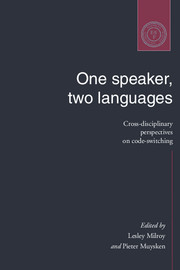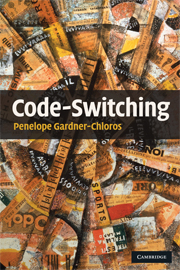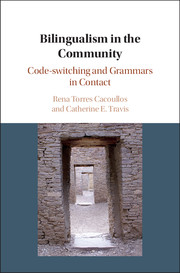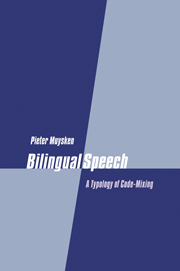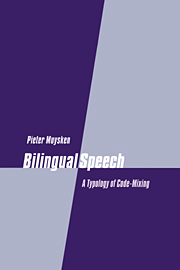One Speaker, Two Languages
Cross-Disciplinary Perspectives on Code-Switching
- Editors:
- Lesley Milroy, University of Newcastle upon Tyne
- Pieter Muysken, Radboud Universiteit Nijmegen
- Date Published: August 1995
- availability: Available
- format: Paperback
- isbn: 9780521479127
Paperback
Looking for an inspection copy?
This title is not currently available for inspection. However, if you are interested in the title for your course we can consider offering an inspection copy. To register your interest please contact [email protected] providing details of the course you are teaching.
-
Code-switching - the alternating use of several languages by bilingual speakers - does not usually indicate lack of competence on the part of the speaker in any of the languages concerned, but results from complex bilingual skills. The reasons why people switch their codes are as varied as the directions from which linguists approach this issue, and raise many sociological, psychological, and grammatical questions. This volume of essays by leading scholars brings together the main strands of current research in four major areas: the policy implications of code-switching in specific institutional and community settings; the perspective of social theory on code-switching as a form of speech behaviour in particular social contexts; the grammatical analysis of code-switching, including the factors that constrain switching even within a sentence; and the implications of code-switching in bilingual processing and development.
Read more- First full-length book to cover the subject of code-switching systematically and comprehensively
- Interdisciplinary focus; excellent introduction to the subject
- Essays by leading scholars in the field, carefully integrated into the volume as a whole
Customer reviews
Not yet reviewed
Be the first to review
Review was not posted due to profanity
×Product details
- Date Published: August 1995
- format: Paperback
- isbn: 9780521479127
- length: 380 pages
- dimensions: 230 x 153 x 30 mm
- weight: 0.62kg
- contains: 22 tables
- availability: Available
Table of Contents
1. Introduction Lesley Milroy and Pieter Muysken
Part I. Code-Switching in Institutional and Community Settings:
2. Bilingual speech of migrant people Louise Dabène and Danièle Moore
3. Code-switching in the context of dialect/standard language relations Anna Giacolone-Ramat
4. Code-switching in community, regional and national repertoires Penelope Gardner-Chloros
5. Code-switching in the classroom Marilyn Martin-Jones
Part II. Code-Switching and Social Life:
6. The pragmatics of code-switching Peter Auer
7. A social network approach to code-switching Lesley Milroy and Li Wei
8. Code-switching and the politics of language Monica Heller
Part III. Grammatical Constraints on Code-Switching:
9. Code-switching and grammatical theory Pieter Muysken
10. Patterns of language mixture Shana Poplack and Marjory Meechan
11. A lexically based production model of code-switching Carol Myers-Scotton
Part IV. Code-Switching in Bilingual Development and Processing:
12. A psycholinguistic approach to code-switching François Grosjean
13. Code-switching in bilingual first language acquisition Regina Köppe and Jürgen M. Meisel
14. The code-switching behaviour of adults with language disorders Kenneth Hyltenstam
Conclusion
15. Code-switching research as a theoretical challenge Andrée Tabouret-Keller.
Sorry, this resource is locked
Please register or sign in to request access. If you are having problems accessing these resources please email [email protected]
Register Sign in» Proceed
You are now leaving the Cambridge University Press website. Your eBook purchase and download will be completed by our partner www.ebooks.com. Please see the permission section of the www.ebooks.com catalogue page for details of the print & copy limits on our eBooks.
Continue ×Are you sure you want to delete your account?
This cannot be undone.
Thank you for your feedback which will help us improve our service.
If you requested a response, we will make sure to get back to you shortly.
×
